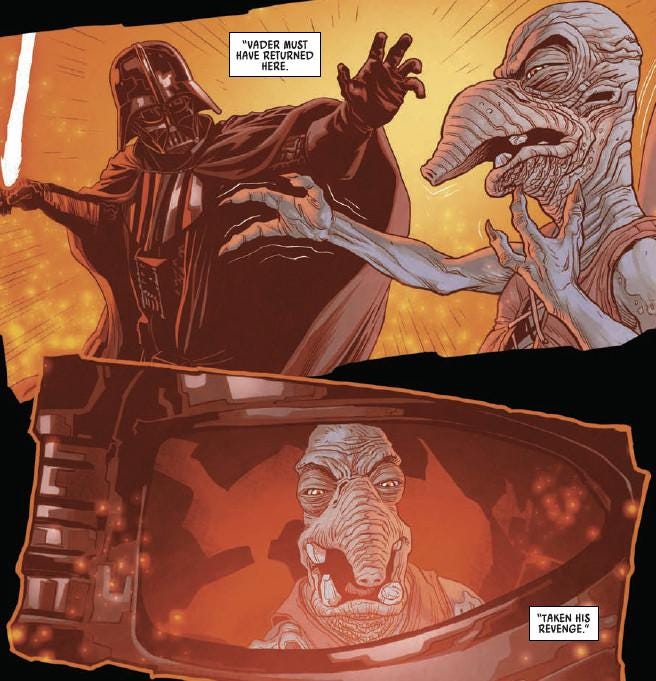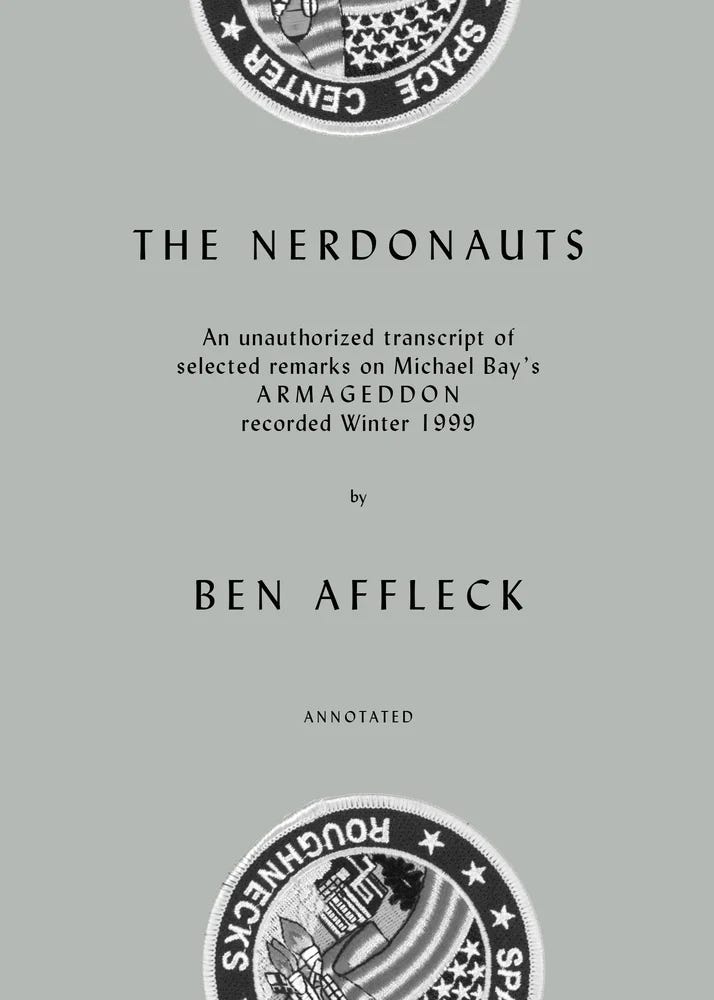Check Book: We're Not Gonna Talk About Emilia Pérez
There's enough of that elsewhere. Also, RIP WATTO.
Surprise! Blank Check has started a newsletter! Your favorite connoisseurs of context are gonna go on even more tangents, commit to even more bits, and share opinions on even more pieces of entertainment industry news because - hey, why not. Thanks for joining us!
IN THIS WEEK’S EDITION:
THE BARDI PARTY REPORT
I’m feeling a little loopy tonight (combination of football heart palpitations / eating the remnants of a large Carvel ice cream cake in my freezer), so here’s a brief rundown of the week in film news.
OSCAR NOMINATIONS
We get it, Emilia Pérez is going to win Best Picture. It’s fine. None of this matters. You know what matters? Timothée Chalamet hosted SNL this weekend and performed back catalog Bob Dylan songs with James Blake for some reason. Kylie Jenner will be going to the Oscars. My friend Zach Silberberg asked @ClubChalamet for a customized birthday message for my birthday this week and she said she “doesn’t do birthdays.” These things are all more culturally significant than Emilia Pérez. I will not remember much about Emilia Pérez (outside of the “Penis to Vagina” song), but I will remember that Timothée Chalamet’s stylist accessorized him with a whole bunch of scarves this awards season, because I guess when people think of Bob Dylan, they think of scarves. The Bob Dylan movie is fine. Not as good as Elvis, not as bad as Bohemian Rhapsody. I like that they filmed the Newport Folk Festival motel scenes in Cape May, NJ. The Springsteen movie is going to be so bad. Anyway.
SUNDANCE
It’s too early in the festival to sense what films are getting the most BUZZ, but I am really excited for If I Had Legs, I’d Kick You, Mary Bronstein’s long-awaited follow-up to Yeast. Streets are saying that Conan O’Brien delivers a barn burner of a monologue.
I’d also just like to share that Deadline referred to Cooper Raiff as a “fast-rising humanist filmmaker,” which, sure. Okay.
HORIZON: AN AMERICAN SAGA - CHAPTER 2…
is having its US premiere next month at the Santa Barbara International Film Festival!!! Wider release plans are still TBD, but Griffin Newman will be attending the SBIFF screening and I’m sure will give us the full lowdown on what Giovanni Ribisi gets up to in this installment.
RIP WATTO
Watto being killed by Darth Vader is now canon as of this week. Couldn’t have happened to a nicer guy.
LET’S CRACK OPEN THE DOSSIER
As detailed in a previous issue of Check Book, cinematographer Vilmos Zsigmond’s praise for a young Steven Spielberg during the production of their first collaboration—The Sugarland Express—was vociferous: “Spielberg is probably the most talented director I've worked with. … I can only compare him to Orson Welles.”1 Yet Zsigmond did not end up shooting Spielberg’s next theatrical feature Jaws, either because, as producer David Brown put it, the “film required a straightforward photographic style” instead of Zsigmond’s cutting-edge cinematography, or because, as Zsigmond himself claimed, “[Jaws was] just a suspense story. I didn’t think I could contribute anything.”2 Close Encounters of the Third Kind, on the other hand, was exactly the kind of assignment that called for an innovative cinematographer, so Zsigmond returned to the fold. However, he found that his director had changed in the intervening years: “Steven started to know all the answers. He was sort of telling me things rather than discussing things.”3 But Spielberg’s growing prowess—and power—was not Zsigmond’s primary concern, as an early disagreement between Zsigmond and the studio over the amount of prelighting time Zsigmond would be afforded—he wanted a day, the studio wanted zero—put the cinematographer directly in the crosshairs of producer Julia Phillips, who quickly, per her incendiary 1991 memoir, “begged Steven to fire” Zsigmond.4 The cinematographer had powerful defenders—among them Spielberg and special effects wizard Douglas Trumbull—but as the budget kept rising, Zsigmond says that he became “the scapegoat for many, many things,” and other cinematographers—including Chinatown’s John A. Alonzo, Easy Rider’s László Kovács, and Fantastic Voyage’s Ernest Laszlo—received inquiries from the studio.5 Though Zsigmond remained on set throughout the location shoot in Mobile, Alabama—which was the bulk of production—other cinematographers were brought in for additional shoots, including future Indiana Jones cinematographer Douglas Slocombe (who shot the India footage), future 1941 cinematographer William A. Fraker (who shot the opening of the film), and Alonzo, Kovács, and future Donnie Darko cinematographer Steven Poster (who all handled inserts). Each were given prominent credits in the film, per Phillips, in “an effort to let the world know how [Vilmos] sandbagged us.”6 But it was just Zsigmond who was ultimately awarded the Oscar for his work on the film, the first and only time the legendary cinematographer received that award, though it was bittersweet: “I always felt bad that they gave these people credit to diminish my credit. … It hurt my credit so badly, because some of the reviewers wrote [that Close Encounters was shot by] ‘Vilmos Zsigmond and all the great cameramen.’ They don’t realize I’m the only one who got the Academy Award. That was a vindication, but it was not really a pleasant vindication.”7 When Zsigmond accepted his Oscar, he declined to thank either his director or his producer, instead saying, “I would like to thank you first to this country, the American people who gave me a second life. I would like to thank my old masters in the Hungarian film school: Illés György, Bojkovszky Béla, and Janós Badal. Also I would like to thank you, all of you.”8 The next day, a “furious” Phillips sent him a telegram that read, simply, “You’re welcome.”9 Though Zsigmond and Spielberg never worked on another film together, the two did repair their relationship, and a decade-plus removed from the production, the cinematographer told biographer Joseph McBride, “I still think [Spielberg]’s the greatest.”10 Phillips and Zsigmond, on the other hand, never mended their issues, though he hopefully took some comfort in knowing that he continued to haunt her dreams in the years following Close Encounters, per Phillips: “Sometimes, though, on a bad night, I can still see a scene being shot, with Vilmos walking into it, and telling his crew that we just need ‘vun leetle inky-dinky over here.’”11
Zsigmond was not the only international icon to feud with Phillips during the making of Close Encounters. There was also François Truffaut, who took his fight to the pages of the Gray Lady, telling the New York Times, “[Close Encounters] started with a budget of $11 million and now I think it is up to $15 million, but that is not Spielberg's fault. It is the fault of the producer, Julia Phillips. She is incompetent. Unprofessional. You can write that. She knows I feel this way. Sometimes it was so disorganized that they had me show up and then do nothing for five days.”12 In her memoir, Phillips claims that she, uh, did not know that he felt that way, by turns calling him a “frog prick extraordinaire”13 and writing, “Of all the dead people I know François Truffaut wins the prick award hands down.”14
In the interest of making this issue more than just an airing of dirty laundry, let’s close with this gentle Spielberg quote about child actor Cary Guffey, an energetic performer who gained the nickname “One Take Cary” and required more toys for his direction than any of the film’s other performers: “There was something about his curiosity and his directness as a three-and-a-half-year-old in making preternatural eye contact with grownups. He responded to visual things more than anything. I would bring gift boxes with toys inside. I would slowly unwrap the gift off-camera. I’d have to be on a step ladder so he would look up. The reason why he is smiling is because he is just waiting to see what’s in the box. At some point he says, ‘Toys!’ because that’s what he was expecting to see. He always got to keep the toys, by the way. Because he was so spontaneous, you couldn’t do a second take—most of the shots of him are take one.”15
WHAT IS THE TEAM INTO THIS WEEK?
David Sims, Host: “I recommend David Mitchell’s book UNRULY which is about British kings and queens. It’s like Horrible Histories for grownups very solid distraction during twin feedings. Pipe down in the back. I also rewatched Shadow of a Doubt for the first time in a zillion years cause it’s leaving Criterion. Teresa Wright is the best.”
Ben Hosley, Producer: “I want to recommended the indie publisher Birchwood Palace Industries. They have such wide array of interesting releases that I know Blankies will dig. I will highlight “Nerdonauts” which is an unauthorized printed collection of remarks Ben Affleck made during the Armageddon commentary.”
AJ McKeon, Editor: “I recommend the app (I think) for your Mac called Clipy. It stores the last 30 things you’ve copied and you can paste any one of them. It’s great! I will never have a computer without it.”
Marie Bardi, Social Media: “I recommend the Philadelphia Eagles. America needs to unite behind them this Super Bowl. The evil must be defeated.”
JJ Bersch, Researcher: “I recommend the BILLY bookshelf from IKEA. Iconic, affordable, adaptable. Makes your Blu-rays look nice after years of sitting in disarray at the hands of a chaotic toddler who has since grown into a much more considerate five-year-old.”
Alan Smithee, Pseudonymous Editor: “I’ll recommend @tatadovnar, a TikTok account that posts fun little analogue horror shorts. I’ve been enjoying them while I still can.”
THIS WEEK ON THE PODCAST
JD Amato returns to spill some real nerdy BTS shit about CLOSE ENCOUNTERS OF THE THIRD KIND. Please use the comment section on our Substack to litigate how many Steven Spielberg movies are about divorce, actually:
The Jelly Trilogy continues with Mickey Blue Eyes. This week, I discovered that Hugh Grant’s 1995 appearance on Jay Leno is one of Griffin Newman’s favorite subjects to talk about
.
COMING SOON:
American Cinematographer, May 1973.
Joseph McBride, Steven Spielberg: A Biography, 296.
McBride, 328.
Julia Phillips, You’ll Never Eat Lunch in This Town Again, 314.
McBride, 329.
Phillips, 314.
McBride, 330.
“1977 (50th) Academy Awards,” Academy Awards Acceptance Speech Database.
Phillips, 314.
McBride, 330.
Phillips, 314.
New York Times, September 26, 1976.
Phillips, 323.
Phillips, 243.
Laurent Bouzereau, Spielberg: The First Ten Years, 142.





















I continue to be such a huge fan of JJ’s notes from the dossier. Thank you for sharing! And excellent looking Criterion shelf might I add
JJ speaking to us all about our movie collections... we know but hey!